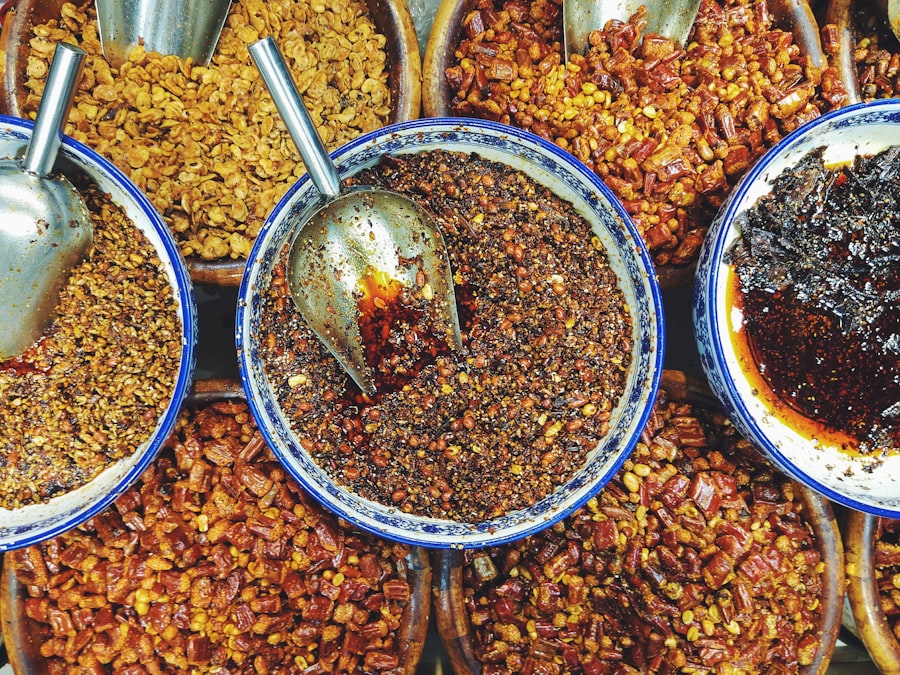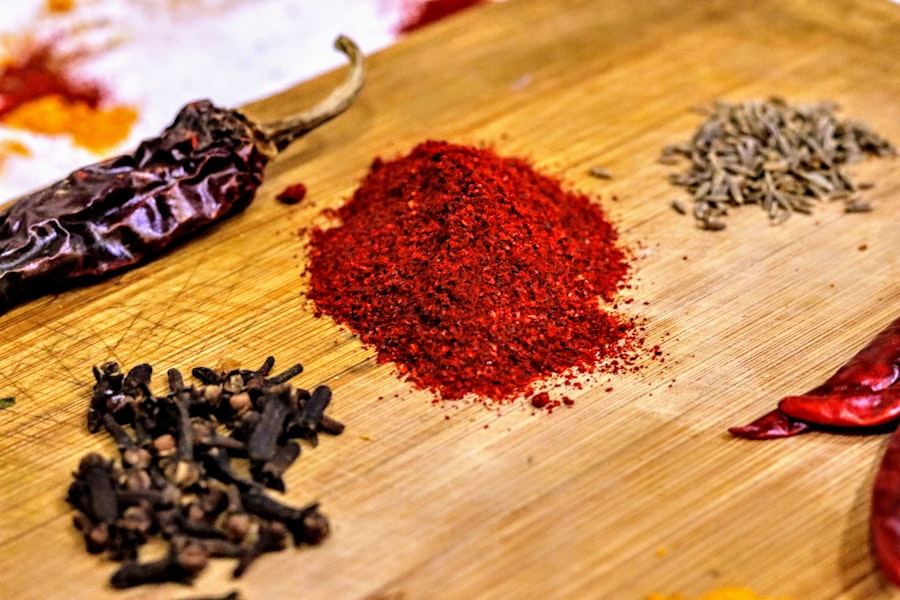In a world where mental acuity is increasingly valued, the quest for cognitive enhancement has led many to explore natural remedies. Among these, spices have emerged as powerful allies in promoting brain health. You may be surprised to learn that the kitchen pantry holds a treasure trove of ingredients that can not only elevate your culinary creations but also support your cognitive function.
From enhancing memory to improving mood, these brain-boosting spices offer a delicious way to nourish your mind. As you delve into the world of spices, you will discover that they are not merely flavor enhancers; they are also packed with antioxidants, anti-inflammatory properties, and essential nutrients. Incorporating these spices into your daily diet can be a simple yet effective strategy for maintaining mental sharpness and emotional well-being.
In the following sections, you will explore some of the most potent spices known for their brain-boosting benefits, each with its unique flavor profile and health advantages.
Key Takeaways
- Introduction to Brain-Boosting Spices: Spices and herbs have been used for centuries for their medicinal properties, including their ability to enhance brain health and cognitive function.
- Turmeric: The Golden Spice for Brain Health: Curcumin, the active compound in turmeric, has been shown to have neuroprotective and anti-inflammatory effects, making it beneficial for brain health.
- Cinnamon: A Sweet Spice with Cognitive Benefits: Cinnamon has been found to improve cognitive function and memory, making it a valuable spice for brain health.
- Rosemary: A Fragrant Herb for Memory Enhancement: The aroma of rosemary has been linked to improved memory and cognitive performance, making it a valuable herb for brain health.
- Ginger: A Zesty Spice for Mental Clarity: Ginger has been shown to have neuroprotective and antioxidant properties, making it beneficial for mental clarity and brain health.
Turmeric: The Golden Spice for Brain Health
Turmeric, often referred to as the golden spice, has gained significant attention for its remarkable health benefits, particularly concerning brain health. The active compound in turmeric, curcumin, is renowned for its anti-inflammatory and antioxidant properties. When you consume turmeric, you may be helping to reduce inflammation in the brain, which is linked to various neurodegenerative diseases.
This spice has been shown to enhance the production of brain-derived neurotrophic factor (BDNF), a protein that plays a crucial role in promoting the survival of neurons and fostering new connections in the brain. Incorporating turmeric into your diet can be as simple as adding it to soups, stews, or smoothies. You might also consider making a warm cup of golden milk by mixing turmeric with milk or a dairy alternative, along with a pinch of black pepper to enhance absorption.
By making turmeric a regular part of your meals, you can harness its potential to support cognitive function and protect against age-related decline.
Cinnamon: A Sweet Spice with Cognitive Benefits

Cinnamon is not just a delightful addition to your favorite baked goods; it also boasts impressive cognitive benefits that can enhance your mental performance. This aromatic spice contains compounds that may help improve memory and attention span. Research suggests that cinnamon can increase insulin sensitivity and regulate blood sugar levels, which is essential for maintaining optimal brain function.
When your blood sugar levels are stable, you are less likely to experience energy crashes that can hinder your focus and productivity. You can easily incorporate cinnamon into your daily routine by sprinkling it on oatmeal, yogurt, or even in your morning coffee. Its sweet and warm flavor makes it a versatile spice that can elevate both sweet and savory dishes.
By enjoying cinnamon regularly, you may find yourself experiencing improved cognitive clarity and enhanced overall well-being.
Rosemary: A Fragrant Herb for Memory Enhancement
| Study | Findings |
|---|---|
| 1. “The effect of rosemary (Rosmarinus officinalis L.) on memory performance in healthy elderly people” | Improved cognitive performance and subjective quality of memory |
| 2. “Aromas of rosemary and lavender essential oils differentially affect cognition and mood in healthy adults” | Rosemary aroma enhanced performance for overall quality of memory and secondary memory factors |
| 3. “The effects of the essential oils of lavender and rosemary on the human short-term memory” | Rosemary essential oil improved performance in memory quality and speed of memory |
Rosemary is more than just a fragrant herb that adds depth to your culinary creations; it has been linked to memory enhancement and improved cognitive function. The aroma of rosemary has been shown to stimulate memory retention and recall, making it an excellent addition to your study sessions or moments when you need to focus. The active compounds in rosemary, such as rosmarinic acid and carnosic acid, possess antioxidant properties that help protect brain cells from oxidative stress.
To reap the benefits of rosemary, consider using it fresh or dried in various dishes, from roasted vegetables to marinades for meats. You might also enjoy brewing rosemary tea or infusing it into olive oil for a flavorful dressing. By incorporating this herb into your meals, you can not only enhance the taste but also support your cognitive health.
Ginger: A Zesty Spice for Mental Clarity
Ginger is a zesty spice that has long been celebrated for its numerous health benefits, including its positive effects on cognitive function. This root contains bioactive compounds like gingerol and shogaol, which have been shown to possess anti-inflammatory and antioxidant properties. These compounds may help protect the brain from oxidative stress and inflammation, both of which are linked to cognitive decline.
Adding ginger to your diet can be both enjoyable and beneficial. You might consider grating fresh ginger into stir-fries, smoothies, or even teas for a refreshing kick. Ginger’s unique flavor profile makes it a versatile ingredient that can enhance both sweet and savory dishes.
By embracing ginger as part of your culinary repertoire, you can support mental clarity and overall brain health.
Saffron: A Luxurious Spice for Mood and Memory

Saffron is often regarded as one of the most luxurious spices in the world, but its benefits extend far beyond its exquisite flavor and vibrant color. This precious spice has been linked to mood enhancement and memory improvement due to its unique chemical composition. Saffron contains compounds like crocin and safranal, which have been shown to have antidepressant effects and may help alleviate symptoms of anxiety and depression.
Incorporating saffron into your diet can be a delightful experience. You might consider adding it to rice dishes, soups, or even desserts for a touch of elegance. While saffron can be more expensive than other spices, a little goes a long way in terms of flavor and health benefits.
By indulging in saffron occasionally, you can enjoy its mood-boosting properties while treating yourself to a culinary delight.
Sage: A Savory Herb for Cognitive Function
Sage is an aromatic herb that has been used for centuries not only for its culinary applications but also for its medicinal properties. This herb is known for its potential to enhance cognitive function and improve memory retention. Studies have suggested that sage may inhibit the breakdown of acetylcholine, a neurotransmitter essential for learning and memory processes.
You can easily incorporate sage into your meals by using it fresh or dried in various dishes such as roasted meats, pasta sauces, or even herbal teas. Its earthy flavor adds depth to savory recipes while providing cognitive benefits that can help sharpen your mind. By making sage a staple in your kitchen, you can enjoy both its delicious taste and its positive impact on brain health.
Black Pepper: A Spice with Antioxidant Properties for Brain Health
Black pepper is often referred to as the “king of spices,” and for good reason. This ubiquitous spice not only enhances the flavor of countless dishes but also offers significant health benefits for the brain. The active compound piperine found in black pepper has been shown to possess antioxidant properties that help protect brain cells from damage caused by free radicals.
In addition to its antioxidant effects, black pepper may also enhance the bioavailability of other nutrients and compounds when consumed together with them. For instance, when paired with turmeric, black pepper significantly increases curcumin absorption in the body. You can easily incorporate black pepper into your meals by using it as a seasoning for meats, vegetables, or salads.
By adding this spice to your diet regularly, you can support your brain health while enjoying its robust flavor.
Nutmeg: A Warm Spice with Neuroprotective Effects
Nutmeg is a warm spice that not only adds depth to sweet dishes but also offers neuroprotective effects that can benefit your brain health.
Nutmeg’s anti-inflammatory properties may also contribute to reducing inflammation in the brain.
You might consider using nutmeg in baked goods like pies or cakes or even sprinkling it on warm beverages like chai or hot chocolate for added warmth and flavor. While nutmeg should be used in moderation due to its potency, incorporating it into your diet can provide both culinary enjoyment and potential cognitive benefits.
Cloves: A Spicy Herb with Anti-Inflammatory Benefits for the Brain
Cloves are small but mighty when it comes to their health benefits, particularly for brain health. These aromatic flower buds contain eugenol, a compound known for its anti-inflammatory properties. Chronic inflammation is linked to various neurological disorders, making cloves an excellent addition to your diet if you’re looking to support cognitive function.
You can easily incorporate cloves into your cooking by using them whole or ground in various dishes such as stews, curries, or even baked goods like gingerbread cookies. Their warm and slightly sweet flavor adds complexity to recipes while providing potential neuroprotective benefits. By embracing cloves as part of your culinary adventures, you can enjoy their unique taste while supporting your brain health.
Incorporating Brain-Boosting Spices into Your Diet
As you explore the world of brain-boosting spices, you’ll find that enhancing your cognitive function doesn’t have to be complicated or bland. By incorporating these flavorful ingredients into your daily meals, you can enjoy both their delicious tastes and their numerous health benefits. From turmeric’s anti-inflammatory properties to cinnamon’s ability to stabilize blood sugar levels, each spice offers unique advantages that contribute to overall brain health.
To make these spices a regular part of your diet, consider experimenting with different recipes and cooking methods that highlight their flavors. Whether you’re adding turmeric to a curry or sprinkling cinnamon on your morning oatmeal, you’ll be taking proactive steps toward supporting your cognitive function and emotional well-being. Embrace the power of these spices as part of a balanced diet, and you’ll not only nourish your body but also give your mind the boost it deserves.
Incorporating the right spices into your diet can significantly enhance brain health, offering a natural way to boost cognitive function and protect against age-related decline. Spices such as turmeric, with its active compound curcumin, have been shown to improve memory and reduce inflammation in the brain. Similarly, cinnamon, known for its antioxidant properties, can help in maintaining brain health by improving blood flow and reducing oxidative stress. For more insights on maintaining cognitive vitality and overall well-being as you age, you can explore related topics in this article on senior health.
WATCH THIS! 🧠 Stop Senior Moments: The Golden Spice That Reverses Memory Loss
FAQs
What are the best spices for brain health?
Some of the best spices for brain health include turmeric, cinnamon, ginger, and saffron. These spices have been shown to have anti-inflammatory and antioxidant properties that can benefit brain function.
How do these spices benefit brain health?
Turmeric contains a compound called curcumin, which has been found to have neuroprotective properties and may help improve memory and reduce the risk of neurodegenerative diseases. Cinnamon has been shown to improve cognitive function and may help protect against age-related cognitive decline. Ginger has anti-inflammatory and antioxidant properties that can help protect the brain from oxidative stress. Saffron has been found to have antidepressant and neuroprotective effects.
How can these spices be incorporated into the diet?
These spices can be easily incorporated into the diet by adding them to various dishes and beverages. Turmeric can be added to curries, soups, and smoothies. Cinnamon can be sprinkled on oatmeal, yogurt, or added to baked goods. Ginger can be used in stir-fries, teas, and smoothies. Saffron can be added to rice dishes, soups, and teas.
Are there any potential side effects of consuming these spices?
While these spices are generally safe when consumed in moderate amounts as part of a balanced diet, some people may experience allergic reactions or digestive issues when consuming them in large quantities. It’s always best to consult with a healthcare professional before making significant changes to your diet, especially if you have any underlying health conditions or are taking medications.
